How to spot phishing emails like the "New Order" email
Phishing/ScamAlso Known As: New Order phishing email
Get free scan and check if your device is infected.
Remove it nowTo use full-featured product, you have to purchase a license for Combo Cleaner. Seven days free trial available. Combo Cleaner is owned and operated by RCS LT, the parent company of PCRisk.com.
What kind of scam is "New Order"?
While investigating this email, we found that it is a scam email. Scammers behind it aim to trick recipients into opening a phishing website and providing information on it. The email is disguised as an inquiry letter regarding some order. This email should be ignored, and its hyperlink should be left unopened.
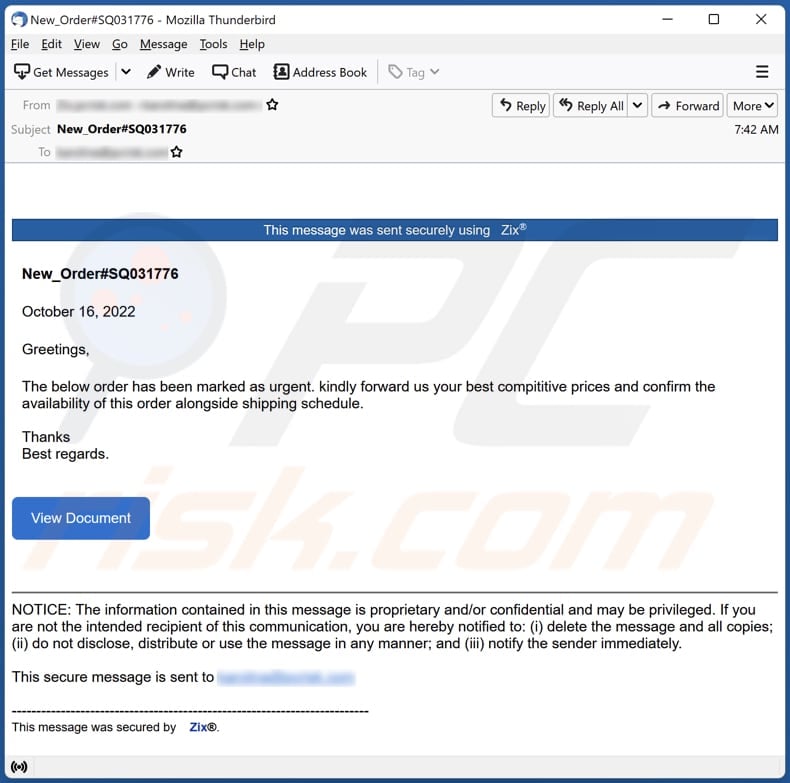
More about the "New Order" email scam
This email claims that the below order has been marked as urgent. It requests recipients to send the best competitive prices and confirm the availability of the order and the shipping schedule. The email also contains the "View Document" button that leads to a phishing website.
That phishing page masquerades as the Bing email account login site. It requests to enter a password (to log into a fake page using email account login credentials). Entering a password on this page can lead to losing an email account other accounts that can be accessed with the same login credentials.
Depending on the types of stolen accounts, they could be used to access personal information, make fraudulent purchases (and transactions), steal identities, send spam, deliver malware, etc. Thus, it is strongly recommended to examine emails and websites before taking any further actions (e.g., replying with personal information or entering such info on pages).
| Name | New Order Email Scam |
| Threat Type | Phishing, Scam, Social Engineering, Fraud |
| Fake Claim | The provided link opens an inquiry document |
| Disguise | Letter from a customer |
| Symptoms | Unauthorized online purchases, changed online account passwords, identity theft, illegal access of the computer. |
| Distribution methods | Deceptive emails, rogue online pop-up ads, search engine poisoning techniques, misspelled domains. |
| Damage | Loss of sensitive private information, monetary loss, identity theft. |
| Malware Removal (Windows) |
To eliminate possible malware infections, scan your computer with legitimate antivirus software. Our security researchers recommend using Combo Cleaner. Download Combo CleanerTo use full-featured product, you have to purchase a license for Combo Cleaner. 7 days free trial available. Combo Cleaner is owned and operated by RCS LT, the parent company of PCRisk.com. |
Phishing emails in general
Usually, scammers behind phishing emails pretend to be legitimate companies, organizations, or other entities. They send emails containing links to phishing pages or requesting to provide personal information directly via email. Most scammers seek to extract login credentials, credit card details, ID card information, and other sensitive details.
Examples of phishing emails are "Un-Received Incoming Emails", "Your Password Has Been Changed", and "Your Email Has Been Restricted". It is important to know that threat actors can use email to trick recipients into infecting their computers.
How do spam campaigns infect computers?
When cybercriminals use email to deliver malware, they aim to trick recipients into opening malicious attachments or links (links to websites designed to distribute malware). Usually, they attach malicious Microsoft Office or PDF documents, JavaScript files, archives like ZIP and RAR, ISO files, or executables.
Not all files infect computers immediately after they are opened. For example, MS Office documents only infect computers if users enable macros commands. It is important to mention that it does not apply to malicious documents opened with MS Office released before 2010. Those versions do not include the Protected View mode.
How to avoid installation of malware?
Be careful about opening files or links in irrelevant emails sent from unknown addresses. It is common for emails of this kind to be used to deliver malware. Download software from official websites and stores. Using other sources (e.g., unofficial sites, P2P networks, third-party downloaders, etc.) is not safe.
Keep the operating system and installed programs updated. Use reputable antivirus software for computer protection. If you've already opened malicious attachments, we recommend running a scan with Combo Cleaner Antivirus for Windows to automatically eliminate infiltrated malware.
Text presented in the "New Order email scam" email letter:
Subject: New_Order#SQ031776
This message was sent securely using ZixNew_Order#SQ031776
October 16, 2022
Greetings,
The below order has been marked as urgent. kindly forward us your best compititive prices and confirm the availability of this order alongside shipping schedule.
Thanks
Best regards.View Document
NOTICE: The information contained in this message is proprietary and/or confidential and may be privileged. If you are not the intended recipient of this communication, you are hereby notified to: (i) delete the message and all copies; (ii) do not disclose, distribute or use the message in any manner; and (iii) notify the sender immediately.This secure message is sent to ********
--------------------------------------------------
This message was secured by Zix.
Screenshot of the phishing website provided in this email:
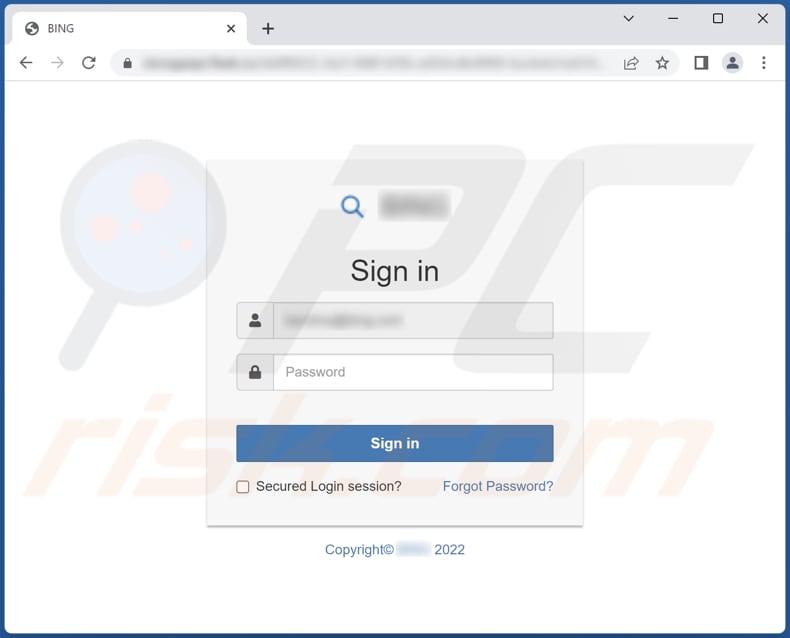
An example of new order-themed spam email spreading malware:
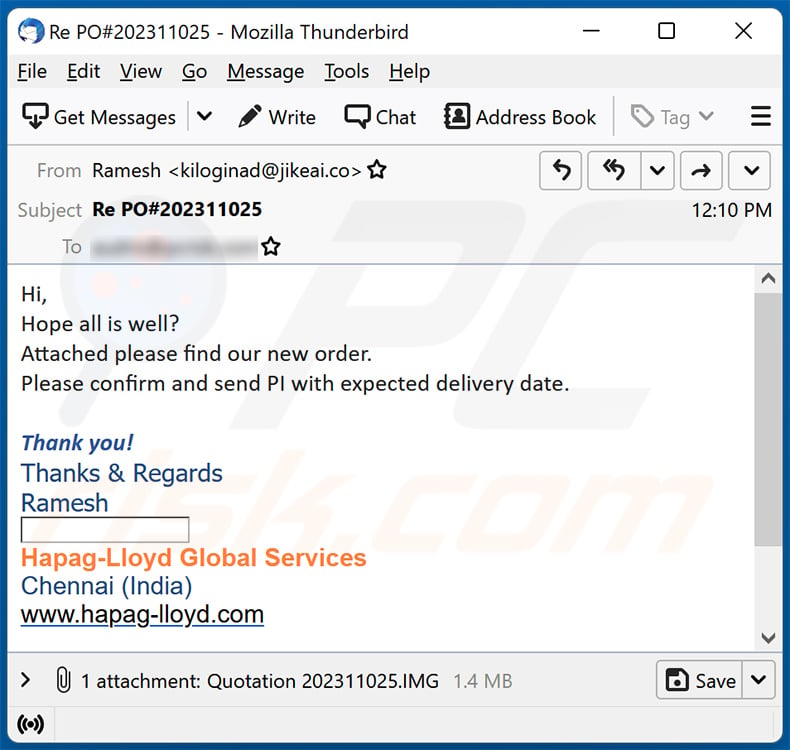
Text presented within:
Subject: Re PO#202311025
Hi,
Hope all is well?
Attached please find our new order.
Please confirm and send PI with expected delivery date.
Thank you!
Thanks & Regards
Ramesh
Hapag-Lloyd Global Services
Chennai (India)
www.hapag-lloyd.com
Another example of an email from "New Order" spam campaign:
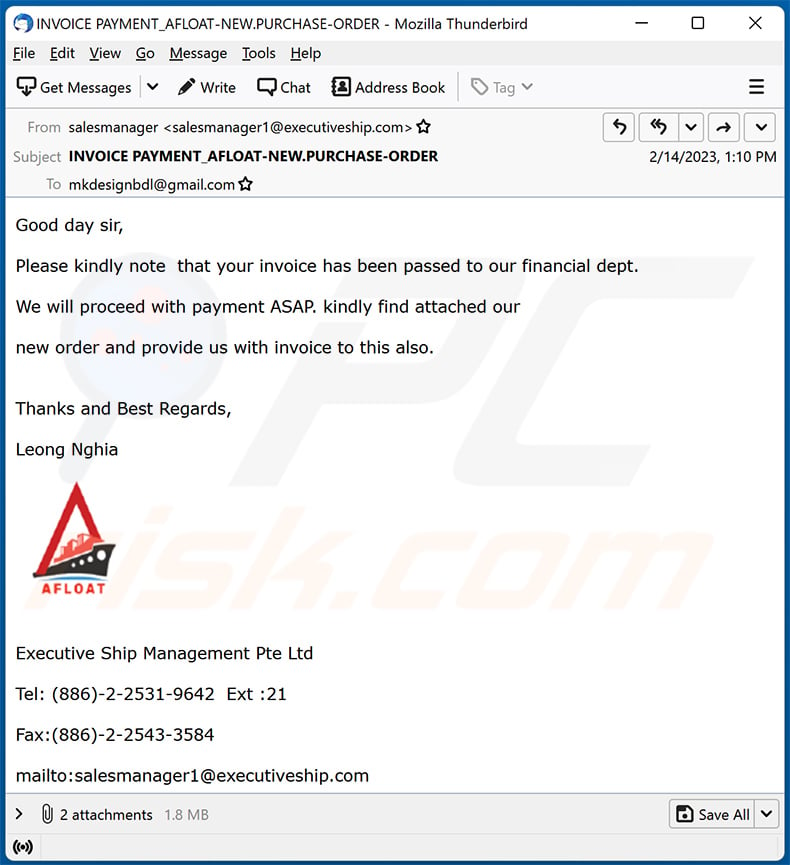
Text presented within:
Subject: INVOICE PAYMENT_AFLOAT-NEW.PURCHASE-ORDER
Good day sir,
Please kindly note that your invoice has been passed to our financial dept.
We will proceed with payment ASAP. kindly find attached our
new order and provide us with invoice to this also.
Thanks and Best Regards,
Leong Nghia
AFLOAT
Executive Ship Management Pte Ltd
Tel: (886)-2-2531-9642 Ext :21
Fax:(886)-2-2543-3584
Yet another example of an email from "New Order" spam campaign:
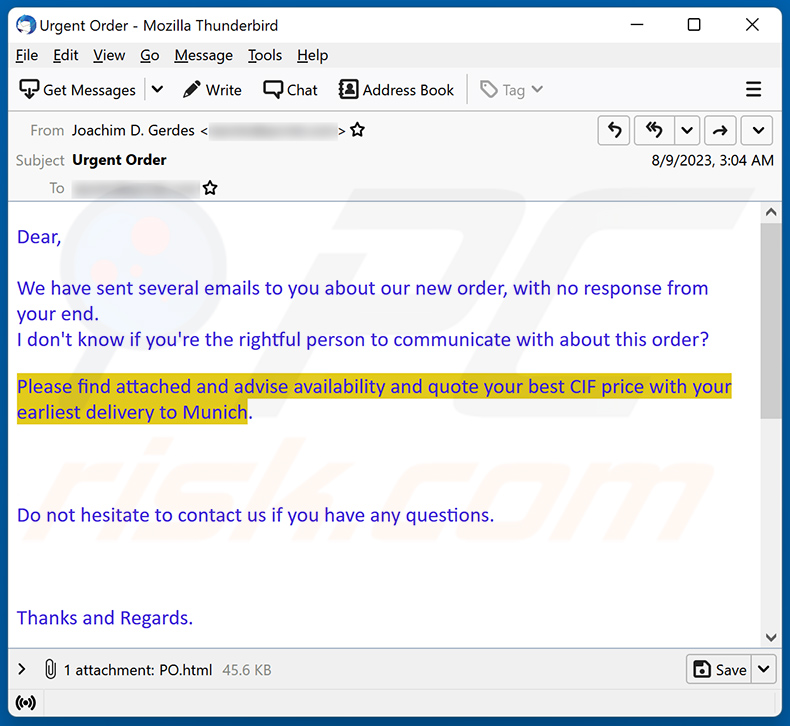
Text presented within:
Subject: Urgent Order
Dear,
We have sent several emails to you about our new order, with no response from your end.
I don't know if you're the rightful person to communicate with about this order?
Please find attached and advise availability and quote your best CIF price with your earliest delivery to Munich.Do not hesitate to contact us if you have any questions.
Thanks and Regards.
Joachim D. Gerdes
THEOLE
Managing Director
CLAGE GmbH
Pirolweg 1-5
21337 Lüneburg, Germany
Email: vcp@theole.nl
Website: hxxps://www.theole.nl
Tel: +49 (4131) 8901-37
Mobile: +49 (172) 4596630
Screenshot of the attached HTML document designed for phishing purposes:
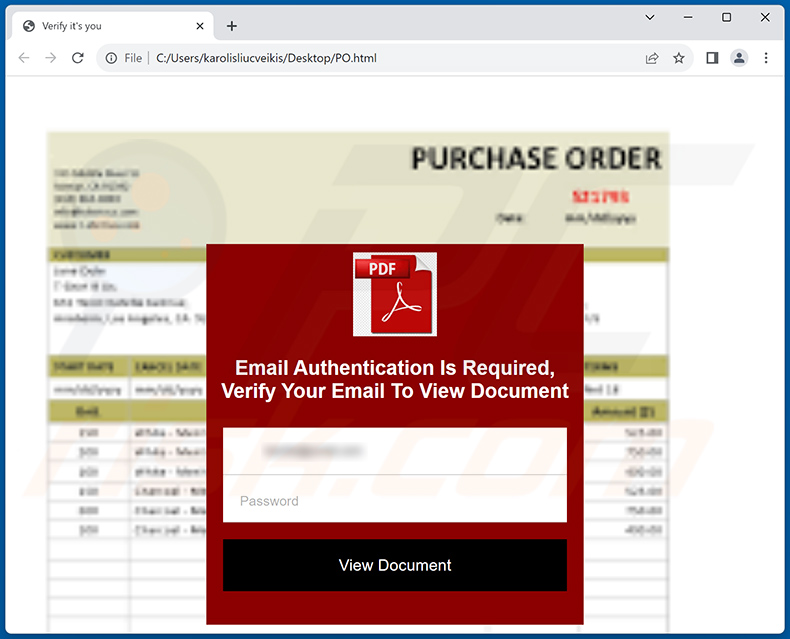
Another example of an email from "New Order" spam campaign:
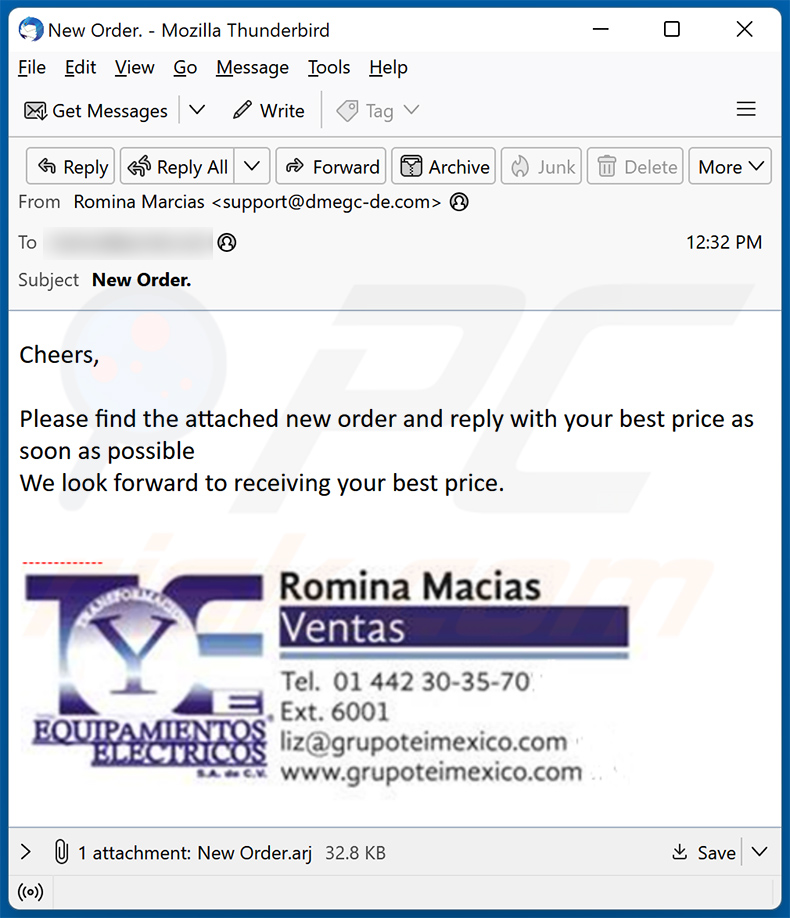
Text presented within:
Subject: New Order.
Cheers,
Please find the attached new order and reply with your best price as soon as possible
We look forward to receiving your best price.Romina Macias
Ventas
Tel. 01 442 30-35-70
Ext. 6001
liz@grupoteimexico.com
www.grupoteimexico.comEQUIPAMIENTOS ELECTRICOS
Screenshot of the attached malicious Microsoft Word document:
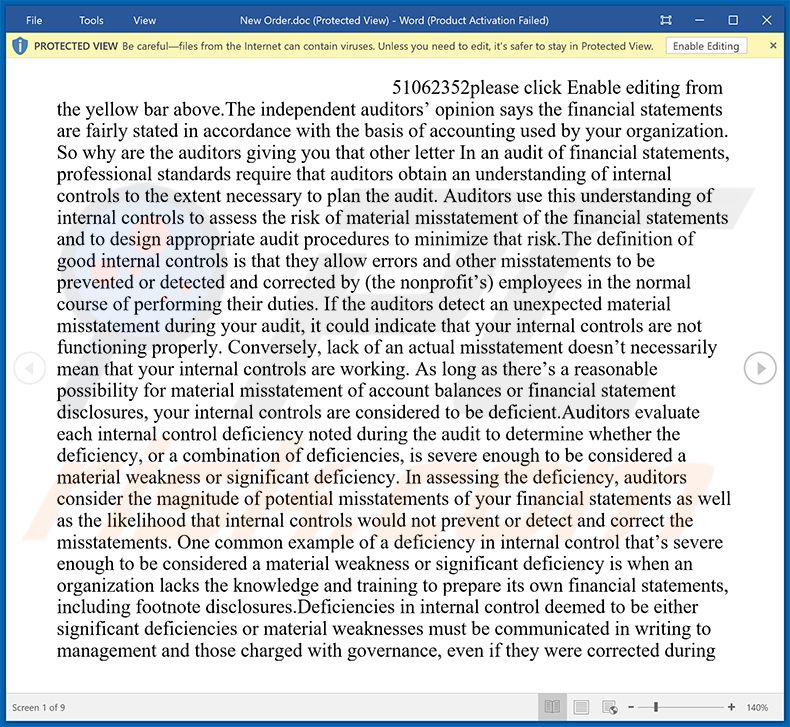
Instant automatic malware removal:
Manual threat removal might be a lengthy and complicated process that requires advanced IT skills. Combo Cleaner is a professional automatic malware removal tool that is recommended to get rid of malware. Download it by clicking the button below:
DOWNLOAD Combo CleanerBy downloading any software listed on this website you agree to our Privacy Policy and Terms of Use. To use full-featured product, you have to purchase a license for Combo Cleaner. 7 days free trial available. Combo Cleaner is owned and operated by RCS LT, the parent company of PCRisk.com.
Quick menu:
- What is New Order phishing email?
- Types of malicious emails.
- How to spot a malicious email?
- What to do if you fell for an email scam?
Types of malicious emails:
![]() Phishing Emails
Phishing Emails
Most commonly, cybercriminals use deceptive emails to trick Internet users into giving away their sensitive private information, for example, login information for various online services, email accounts, or online banking information.
Such attacks are called phishing. In a phishing attack, cybercriminals usually send an email message with some popular service logo (for example, Microsoft, DHL, Amazon, Netflix), create urgency (wrong shipping address, expired password, etc.), and place a link which they hope their potential victims will click on.
After clicking the link presented in such email message, victims are redirected to a fake website that looks identical or extremely similar to the original one. Victims are then asked to enter their password, credit card details, or some other information that gets stolen by cybercriminals.
![]() Emails with Malicious Attachments
Emails with Malicious Attachments
Another popular attack vector is email spam with malicious attachments that infect users' computers with malware. Malicious attachments usually carry trojans that are capable of stealing passwords, banking information, and other sensitive information.
In such attacks, cybercriminals' main goal is to trick their potential victims into opening an infected email attachment. To achieve this goal, email messages usually talk about recently received invoices, faxes, or voice messages.
If a potential victim falls for the lure and opens the attachment, their computers get infected, and cybercriminals can collect a lot of sensitive information.
While it's a more complicated method to steal personal information (spam filters and antivirus programs usually detect such attempts), if successful, cybercriminals can get a much wider array of data and can collect information for a long period of time.
![]() Sextortion Emails
Sextortion Emails
This is a type of phishing. In this case, users receive an email claiming that a cybercriminal could access the webcam of the potential victim and has a video recording of one's masturbation.
To get rid of the video, victims are asked to pay a ransom (usually using Bitcoin or another cryptocurrency). Nevertheless, all of these claims are false - users who receive such emails should ignore and delete them.
How to spot a malicious email?
While cyber criminals try to make their lure emails look trustworthy, here are some things that you should look for when trying to spot a phishing email:
- Check the sender's ("from") email address: Hover your mouse over the "from" address and check if it's legitimate. For example, if you received an email from Microsoft, be sure to check if the email address is @microsoft.com and not something suspicious like @m1crosoft.com, @microsfot.com, @account-security-noreply.com, etc.
- Check for generic greetings: If the greeting in the email is "Dear user", "Dear @youremail.com", "Dear valued customer", this should raise suspiciousness. Most commonly, companies call you by your name. Lack of this information could signal a phishing attempt.
- Check the links in the email: Hover your mouse over the link presented in the email, if the link that appears seems suspicious, don't click it. For example, if you received an email from Microsoft and the link in the email shows that it will go to firebasestorage.googleapis.com/v0... you shouldn't trust it. It's best not to click any links in the emails but to visit the company website that sent you the email in the first place.
- Don't blindly trust email attachments: Most commonly, legitimate companies will ask you to log in to their website and to view any documents there; if you received an email with an attachment, it's a good idea to scan it with an antivirus application. Infected email attachments are a common attack vector used by cybercriminals.
To minimise the risk of opening phishing and malicious emails we recommend using Combo Cleaner Antivirus for Windows.
Example of a spam email:

What to do if you fell for an email scam?
- If you clicked on a link in a phishing email and entered your password - be sure to change your password as soon as possible. Usually, cybercriminals collect stolen credentials and then sell them to other groups that use them for malicious purposes. If you change your password in a timely manner, there's a chance that criminals won't have enough time to do any damage.
- If you entered your credit card information - contact your bank as soon as possible and explain the situation. There's a good chance that you will need to cancel your compromised credit card and get a new one.
- If you see any signs of identity theft - you should immediately contact the Federal Trade Commission. This institution will collect information about your situation and create a personal recovery plan.
- If you opened a malicious attachment - your computer is probably infected, you should scan it with a reputable antivirus application. For this purpose, we recommend using Combo Cleaner Antivirus for Windows.
- Help other Internet users - report phishing emails to Anti-Phishing Working Group, FBI’s Internet Crime Complaint Center, National Fraud Information Center and U.S. Department of Justice.
Frequently Asked Questions (FAQ)
Why did I receive this email?
Typically, scammers use emails leaked in data breaches, provided on untrustworthy websites, and in other ways. In all cases, they send the same email to all (or most) addresses they have obtained. Their emails are not personal.
I have provided my personal information when tricked by this email, what should I do?
If you opened the phishing website via the received hyperlink and provided your password on it, change all passwords as soon as possible. Especially if you use the same (or virtually identical) password for more than one account.
I have downloaded and opened a malicious file attached to an email, is my computer infected?
If you have opened an executable file, your computer is probably infected. In other cases (e.g., if the file you opened is an MS Office document or archive file), your computer may not be infected since different file types inject malware in different ways. Certain files cannot infect computers without taking additional steps.
I have read the email but didn't open the attachment, is my computer infected?
It is harmless to open an email. Thus, your computer is not infected if you have left a file or link in it unopened.
Will Combo Cleaner remove malware infections that were present in email attachment?
Yes, Combo Cleaner can detect and remove almost all known malware. It is recommended to scan potentially infected computers using a full scan to detect (and remove) high-end malware. Typically, malware of this kind hides deep in the operating system.
Share:

Tomas Meskauskas
Expert security researcher, professional malware analyst
I am passionate about computer security and technology. I have an experience of over 10 years working in various companies related to computer technical issue solving and Internet security. I have been working as an author and editor for pcrisk.com since 2010. Follow me on Twitter and LinkedIn to stay informed about the latest online security threats.
PCrisk security portal is brought by a company RCS LT.
Joined forces of security researchers help educate computer users about the latest online security threats. More information about the company RCS LT.
Our malware removal guides are free. However, if you want to support us you can send us a donation.
DonatePCrisk security portal is brought by a company RCS LT.
Joined forces of security researchers help educate computer users about the latest online security threats. More information about the company RCS LT.
Our malware removal guides are free. However, if you want to support us you can send us a donation.
Donate
▼ Show Discussion